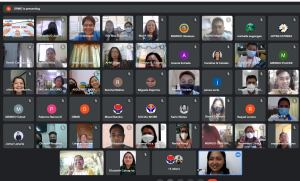The Department of Social Welfare and Development (DSWD) Field Office Caraga through its Disaster Response & Management Division (DRMD) conducted a Virtual Orientation on the Guidelines of Disaster Response Operations Monitoring & Information Center (DROMIC), AO 2 series of 2021 otherwise known as the Omnibus Guidelines on Food and Non-Food Items (FNI) and Logistics Management for Disaster Response Operations, and the Risk Resiliency Program- Climate Change Adaptation (RRP-CCAM) Implementation for CY 2022-2023 on June 11 & 14, 2021.
This was participated by the Provincial and Municipal Social Welfare Development Officers (P/MSWDO), together with the representatives from different Provincial and Municipal Disaster Risk Reduction and Management Office (P/MDRRMO), PENRO and PPDO of the region.

During the discussion on the operational guidelines of the DROMIC, Mr. John A. Leonardo, DRIM Section Head, one of the resource speakers, highlighted the importance of the roles of the LGU during disaster response; especially on giving accurate data and reports. Thus, DROMIC reporting templates were provided. “Since DROMIC report is one of the necessary data for augmentation, the accurate inputs of data or report from the LGUs is very crucial” said Leonardo in local dialect. To complement this, Engr. Raul J. Sabandal, Section Head, also discussed the Administrative Order 2 series of 2021; underscoring the requirements for request of augmentation.
Moreover, to leg up on the continuation of the implementation of the RRP-CCAM for next year, Ms. Melanie G. Juan, DRMD Chief, revisited the program’s over-all goals and objectives; including the accomplished RRP-CCAM projects in the past years since its implementation. She also highlighted the need to conduct Performance Assessment by the LGUs for last year’s implementation for submission to CCAM-DRR Cabinet Cluster in order to facilitate request for funding for program expansion. “As of June 14, 2021, a total of 12, 266 Cash-For-Work beneficiaries were served. Meanwhile, 72, 930 beneficiaries will be the target for the year 2022 which was also based on the priority provinces as identified by DENR,” Juan said during her presentation.

